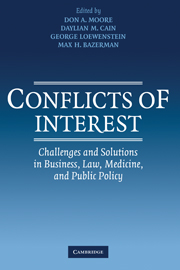Book contents
- Frontmatter
- Contents
- List of Contributors
- Acknowledgments
- Introduction
- PART ONE BUSINESS
- PART TWO MEDICINE
- 9 Physicians' Financial Ties with the Pharmaceutical Industry: A Critical Element of a Formidable Marketing Network
- 10 Commentary: How Did We Get into this Mess?
- 11 Why Are (Some) Conflicts of Interest in Medicine So Uniquely Vexing?
- 12 Commentary: Financial Conflicts of Interest and the Identity of Academic Medicine
- PART THREE LAW
- PART FOUR PUBLIC POLICY
- Index
- References
12 - Commentary: Financial Conflicts of Interest and the Identity of Academic Medicine
Published online by Cambridge University Press: 04 August 2010
- Frontmatter
- Contents
- List of Contributors
- Acknowledgments
- Introduction
- PART ONE BUSINESS
- PART TWO MEDICINE
- 9 Physicians' Financial Ties with the Pharmaceutical Industry: A Critical Element of a Formidable Marketing Network
- 10 Commentary: How Did We Get into this Mess?
- 11 Why Are (Some) Conflicts of Interest in Medicine So Uniquely Vexing?
- 12 Commentary: Financial Conflicts of Interest and the Identity of Academic Medicine
- PART THREE LAW
- PART FOUR PUBLIC POLICY
- Index
- References
Summary
Andrew Stark sees intractable polarization in the conflicts of interest debates in biomedicine and wants to move them forward by clarifying one of the underlying causes. The key to his argument is a distinction between internal versus external conflicts of interest. Stark's thesis is immensely useful, even if some of his empirical assumptions are somewhat questionable. But to focus on these details would be to miss the meat of Stark's argument. Rather, I want to burrow deeper into the internal/external distinction. The two goals of this commentary will therefore be to, first, briefly clarify the distinction between internal and external conflicts, and two, draw out in broad strokes its key implications.
In what follows, the reader can assume that the main set of conflicts of interest that I am referring to are those that arise for academic physicians, in the realm of creation and dissemination of clinical knowledge. In my view, the academic physician clearly sits on the moral fulcrum of this debate.
INTERNAL AND EXTERNAL CONFLICTS OF INTEREST
Although the distinction between internal and external conflicts of interest has intuitive appeal, Stark's discussion of it can sometimes be confusing. An uncharitable reader might argue that the “blurring” of the internal/external distinction that Stark sees in medical conflicts of interest may actually be due to an instability in his description (rather than in the relatively unique features of the medical profession). Because this is the central idea of his essay, it deserves some attention.
- Type
- Chapter
- Information
- Conflicts of InterestChallenges and Solutions in Business, Law, Medicine, and Public Policy, pp. 181 - 186Publisher: Cambridge University PressPrint publication year: 2005



